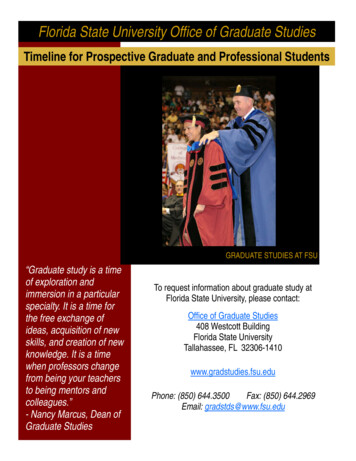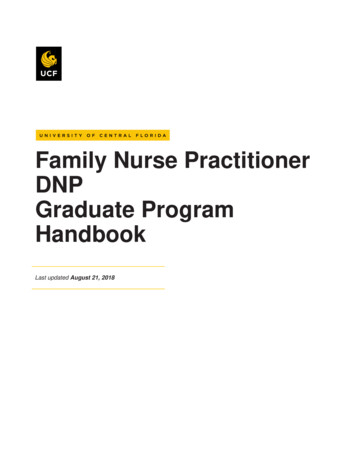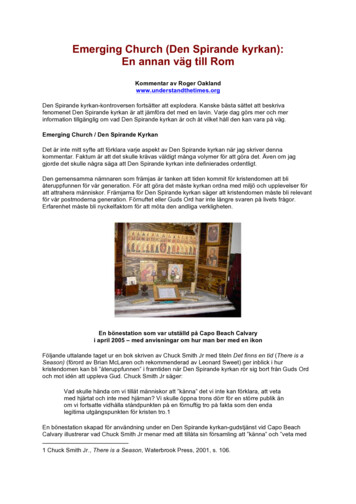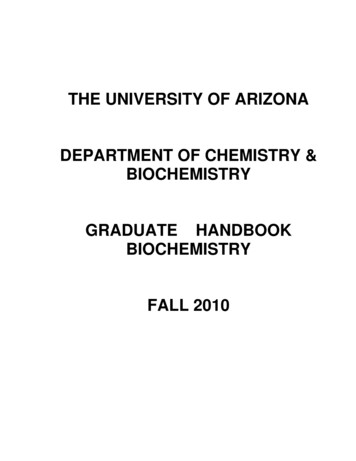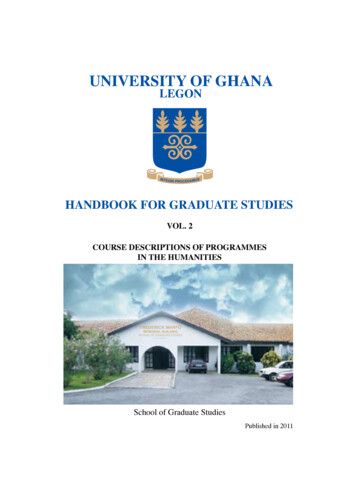
Transcription
UNIVERSITY OF GHANALEGONHANDBOOK FOR GRADUATE STUDIESVOL. 2COURSE DESCRIPTIONS OF PROGRAMMESIN THE HUMANITIESFREDERICK MARFOMEMORIAL BUILDINGSCHOOL OF GRADUATE STUDIESSchool of Graduate StudiesPublished in 2011
FREDERICK MARFOMEMORIAL BUILDINGSCHOOL OF GRADUATE STUDIES
NOTE TO THE CURRENT EDITION OF THEGRADUATE HANDBOOKTHIS EDITION OF THE GRADUATE HANDBOOK IS THE REVISED VERSIONOF THE 2009 HANDBOOK WHICH WAS APPROVED BY THE UNIVERSITY.THE CURRENT EDITION IS PUBLISHED IN THREE VOLUMES AS FOLLOWS:VOLUME 1:REGULATIONS GOVERNING GRADUATE STUDYAND EXAMINATION REGULATIONS.VOLUME 2:COURSE DESCRIPTIONS OF PROGRAMMESIN THE HUMANITIESVOLUME 3:COURSE DESCRIPTIONS OF PROGRAMMES INTHE SCIENCES.EVERY GRADUATE STUDENT IS THEREFORE EXPECTED TO OBTAINVOLUME 1 AND EITHER VOLUME 2 OR 3, DEPENDING ON HIS/HER CHOSENPROGRAMME OF STUDIES.DEAN OF GRADUATE STUDIESAUGUST 2011
VOLUME 2COURSE DESCRIPTIONS OF PROGRAMMESIN THE HUMANITIES
TABLE OF CONTENTS1.General Information on the University of Ghana 2.Faculty of Arts Department of English Department of Linguistics Department of Modern Languages Department of Music Department of Philosophy and ClassicsDepartment for the Study of ReligionsDepartment of Theatre Arts 1313183045496169-81172944486068823.Faculty of Social Studies Department of Archaeology and Heritage Studies Department of Economics Department of Geography & Resource Dev. Department of History Department of Information Studies Department of Political Science Department of Psychology Department of Sociology Department of Social Work School of Communication Studies Institute of Statistical, Social and Economic Research (ISSER) Centre for Social Policy Studies Institute of Continuing and Distance Education . Institute of African Studies Legon Centre for International Affairs & Diplomacy (LECIAD) Regional Institute for Population Studies (RIPS) Centre for Migration Studies 062124.Faculty of Law 213 - 2285.University of Ghana Business School Master of Business Administration (MBA) Master of Public Administration (MPA) Department of Marketing and Customer Management ProgrammesDepartment of Finance Programmes Executive MBA Programme 229229236244263274 2 --12286235243262273286
UNIVERSITY OF GHANALEGON(Motto: Integri Procedamus)Established: A.D. 1948THE ARMS OF THE UNIVERSITYBlue shield with three “AYA” standingUpright in top half and “DWENINMENTOASO”In the middle of bottom half – all embossedin gold. (Designed by A.M. Opoku)1
THE UNIVERSITY OF GHANAGENERAL INFORMATIONPostal AddressFaxTelephoneE-mailP. O. Box LG 25, Legon, Ghana(233-302) 500383/502701(233-302) 14552academic@ug.edu.ghpad@ug.edu.ghOverseas AddressThe Overseas RepresentativeUniversities of Ghana Office321 City Road, London, ECIV ILJ, EnglandTel: 44 (0) 207-2787-413Fax: 44 (0) 2077-135-776E-mail: ugoouk@aol.comAcademic Year-August to MayLanguage of Instruction-EnglishSolicitorsBentsi-Enchill, Letsa and Ankomah1st Floor Teachers’ Hall Annex, Education Loop(Off Barnes Road) AdabrakaP.O. Box 1632, AccraLexcom AssociatesLegal Practitioners and ConsultantsP. O. Box 11428, Accra-NorthBankersGhana Commercial Bank, Legon Branch, GhanaStandard Chartered Bank, Legon Branch, GhanaECOBANK Legon Branch, Ghana-Ghana International Bank, Plc69 Cheapside, London EC.2, England.Citibank, N.A. 046P.O. 5870 Grand Central StationNew York, NY 10163USAAuditorsOsei Kwabena and Associates(Chartered Accountants)71 Palace Street, B 603/18North KaneshieP.O. Box 10276, Accra-NorthAll communication should be addressed to:THE REGISTRARUNIVERSITY OF GHANAP.O. Box LG 25Legon, Ghana2
MEMBERSHIP OF THE UNIVERSITY COUNCILJustice Samuel K. Date-BahProfessor Ernest AryeeteyMrs. Elizabeth AdaborProfessor John Meyer HydeProfessor Robert D. BaetaProfessor Francis N.A. DodooDr. Elsie Effah KaufmannMr. J.K. KlinogoMr. Richard Kwame AsanteDr. Kodzo GavuaMr. Kwesi YankeyMr. Samuel Ofori-AdjeiMr. Rester TogormeyMr. Benedict SumahMr. Augustine Saakuur-Karbo -ChairmanVice-ChancellorAppointed by GovernmentAppointed by GovernmentAppointed by GovernmentElected by ConvocationElected by ConvocationAppointed by CouncilAppointed by CouncilRepresenting University TeachersAssociation of Ghana (UTAG)Representing University of GhanaAlumni AssociationRepresenting the Conference of Headsof Assisted Secondary Schools (CHASS)Representing Graduate StudentsRepresenting Students’ RepresentativeCouncil (SRC)Representing the TEWU of TUCIn AttendanceProfessor E. K. OsamProfessor John GyapongMr. Edward EffahMr. Ken Ofori-AttaMr. R.O. BoapeaMr. Joseph M. BuduPro-Vice-Chancellor (Academic andStudent Affairs)Pro-Vice-Chancellor (ResearchInnovation and Development)Chairman, Council of Collegeof Health SciencesChairman, Council of Collegeof Agriculture and Consumer SciencesDirector, Finance DirectorateRegistrar/Secretary3
UNIVERSITY OFFICERSCHANCELLORKofi Annan(Kumasi) DEA (UHEI) MSc (Massachusetts)PRINCIPAL OFFICERSChairman, University Council-Samuel K. Date-BahLLB (Ghana) BL LLM (Yale), PhD (London)Vice-ChancellorBA (Econ) MA (Ghana) MSc (Kumasi) PhD (Dortmund)Ernest AryeeteyOTHER OFFICERSPro-Vice-Chancellor(Academic and Student Affairs)Pro-Vice-Chancellor(Research, Innovation andDevelopment)RegistrarUniversity LibrarianEmmanuel K. A. OsamBA MPhil (Ghana) PhD (Oregon)John GyapongBSc (KNUST), MSc, PhD (London)Joseph M. BuduBA (Ghana) Dip Ed MA (London)Ellis E. BaduBSc(KNUST), Grad. Dip. (Lib. Stud.)(Ghana),MInfSc (Ibadan), PhD (Sheffield)OFFICES OF PROVOSTSCollege of Health Sciences-Aaron N. L. LawsonMB ChB (Ghana) PhD (Leicester)BSc (Agric) (Ghana), MPhil (Lond) Dip(Seed Pathology) (Den) PhD (Lond) DICCollege of Agriculture andConsumer SciencesOFFICES OF DEANSSchool of AgricultureFaculty of ArtsSamuel K. Offei-Faculty of LawFaculty of Engineering SciencesFaculty of ScienceFaculty of Social StudiesJohn Ofosu-Anim (Acting)BSc (Ghana), MSc (Kagawa, Japan),PhD (Nagoya, Japan)Rev. Prof. Cephas N. Omenyo (Vice-Dean)BA, MPhil (Ghana), PhD (Utrecht)Edward K. QuashigahLLB (Ghana) LLM PhD (Nigeria)Richard BaniBSc(KNUST), MSc PhD (Eng.,, Cranfield)Daniel K. AsieduBSc (Ghana) MSc, PhD (Okayama)Samuel Agyei-MensahBA (Ghana) MPhil PhD (Trondheim)4
Business School-Kwame A. DomfehBA, MPA, PhD (Ghana)Christine Ntim-AmponsahMedical SchoolBDS (Ghana) FRCPS FWACSDental SchoolBDS (Ghana) MSc FEACOP FRCDS (Canada)School of Allied Health SciencesMB ChB (Ghana) FRCPath, MIAC FWACPGraduate StudiesBSc (Agric) (Ghana) MSc PhD (Sask)Dean of StudentsBSc M.Phil PhD (Ghana)International ProgrammesMSc (Ghana) PhD (Monash)Accra City CampusBA (Ghana) PhD (Ibadan)School of NursingGrace ParkinsEdwin K. WireduKwadwo OforiJames K. Adomako,Naa Ayikailey AdamafioJohn F. WireduErnestina Sarfoa Donkor (Acting)BSc (Ghana) MSc (Ulster)PhD (Lond) GCAP (UK) FWCNSchool of Public HealthMB ChB (Ghana) MPH (Hebrew) PhD (Basel)Fred N. BinkaDIRECTORS OF SCHOOLS/INSTITUTES/CENTRESInstitute of Continuing andDistance EducationYaw Oheneba-SakyiBA (Ghana) MA (SUNY) PhD (Brigham Young)Akosua Adomako AmpofoInstitute of African Studies-Institute of Agricultural Research-BSc, MSc (Ghana) PhD (London) DICInstitute of Statistical Socialand Economic Research-BA (Hons) MA (Ghana) MPH (Johns Hopkins) PhD (Cornell)Noguchi Memorial Institute forMedical ResearchRegional Institute for Population StudiesSchool of Communication StudiesSchool of Performing ArtsLegon Centre for InternationalAffairsCentre for Tropical ClinicalPharmacology and TherapeuticsBSc MSc (Kumasi) PhD (Vanderbilt)Kwame Afreh-NuamahClement AhiadekeAlexander K. NyarkoMSc (Ghana) PhD (Philadelphia)Francis N.A. DodooBA MA (Washington State) PhD (Pennsylvania)Margaret I. Amoakohene (Acting)BA MPhil (Ghana) PhD (Leicester)Awo M. Asiedu (Acting)BA MPhil (Ghana) PhD (Birmingham)Kwame Boafo-ArthurBA (Ghana) MA (Carleton) PhD BL (Ghana) LLBAlexander N.O. DodooBPharm (Hons) (Kumasi) MSc (Lond) PhD (Lond)5
Sika Ahadzie (Acting)Language CentreBA MPhil (Ghana) PhD (Birmingham)Ecology Laboratory CentreBSc Educ (Cape Coast)) MSc PhD (Ghana)Centre for Social Policy StudiesBA (Kumasi)) MA (Reading) PhD (Michigan)Centre for Gender Studiesand AdvocacyMA (The Hague) MPhil (Ghana)LL BL (Ghana) PhD (Leiden)Centre for Migration StudiesBA Grad.Dip (Ghana) PhD (Newcastle)Academic Quality Assurance Unit -VacantWest Africa Centre for CropImprovementBSc (Agric) (Ghana) MPhil PhD (Camb)Institute of Environment andSanitation SciencesBSc, MSc (Ghana) PhD (Lond)Patrick K. Ofori-DansonEllen Bortei-Doku AryeeteyDzodzi A. TsikataMariama AwumbilaEric Y. DanquahChristopher GordonADMINISTRATIVE DIRECTORATES/UNITSCollege of Health SciencesCollege of Agriculture andConsumer SciencesFrank K. Yeboah (College Registrar)BA MPA (Ghana)Peter B. Yarquah (College Registrar)BA (Hon), Grad.Dip. (Comm. Studies) (Ghana)M.Ed (Birmingham) APR (Ghana)R.O. BoapeaFinance DirectorateBSc (Hons)Admin(Ghana), CA (Gh)Academic Affairs DirectorateBA MPA (Ghana)Physical Development andMunicipal Services DirectorateDip Ing ARCH (Sarajevo) AGIAUniversity Health ServicesBSc MB ChBPublic Affairs DirectorateBA MA (Int Affairs) (Ghana))Human Resource andOrganisational DevelopmentBA EMBA (Ghana)Internal AuditBA MSc UCE) ACCA CFS FCCAPlanning and ManagementInformation Services SystemsBSc MBA (Ghana)Counseling and Placement CentreBSc (Ghana) MEd PGCE (Cape Coast)ICT DirectorateBSc (Ghana) MBA (Ghana/Vrieje)Enoch A. AmarteyPhilip AzundowJosephina M. Blankson-Hemans (Acting)Stella A. AmoaMercy Haizel AshiaGeorge A HabibAlfred Quartey (Acting)John G. Egyir-Croffet (Acting)Emmanuel Owusu-Oware6
Sports DirectorateEmmanuel Owusu-AnsahDip (Hennef) MSc PhD (Poland)Executive Masters in Sports Mgmt. (Lyon)University of GhanaBasic SchoolsDip Ed (Winneba) BEd MEd (Cape Coast) PGDE (India)Student Financial Aid OfficeBBA (Liberia) MBA (Ghana)University of Ghana HostelsBSc (Hons) (Kumasi)Cecilia Morrison (Headmistress)Christine BaningMartin Asiedu (General Manager)HEADS OF arbahDavid Atta-PetersBSc MPhil PhD (Ghana)Vladimir Antwi-DansoBA (Ghana), PhD (Leningrad), MA (Tufts)George ArmahBSc MSc (Ghana) PhD (Osaka)Esther O. Sakyi-DawsonBSc MPhil (Ghana) PhD (Cornell)Josephine Dzahene-QuarshieBA (Ghana) PhD (Lond)(Vice Master)Post Graduate Studies/Kwadwo OforiBSc (Agric) (Ghana) MSc PhD (Sask)Valco Trust HostelsInternational Students’ Hostel/Naa Ayikailey AdamafioMSc (Ghana) PhD (Monash)Jubilee HallSENIOR TUTORSLegonMalcom JosiahBSc (Kumasi) MSc MPhil (Newcastle)PhD (Calif) MGhIE MASABE MGSAEAkuafoBA MPhil PhD (Ghana)CommonwealthBSc (Agric) (Ghana) MSc PhD (Iwate)Volta-Mensah Sarbah-George Akanlig-PareThomas Aquinas AdjadehAngelina Lily ArmahBA (Hons) Grad Dip (Lib Stud) MPhil (Info Stud) (Ghana)Ted Y. AnnangBSc MPhil PhD (Ghana)MEMBERS OF THE BOARD OF GRADUATE STUDIESProf. Kwadwo Ofori (Chairman) (Dean, SGS)BSc(Agric) (Ghana), MSc PhD (Sask)Prof. Harry Akussah(Vice-Dean, SGS)BA, Grad Dip, MA, PhD (Ghana) MSc (London)-7
Rev. Prof. Cephas N. Omenyo(Faculty of Arts)-BA, MPhil (Ghana), PhD (Utrecht)Prof. Kofi Agyekum(Faculty of Arts)-BA(Ghana) MPhil (Trondheim) PhD (Ghana)Prof. E.K. Quashigah(Faculty of Law)-LLB (Ghana), LLM, PhD (Nigeria)Dr. N.A. Josiah-Aryeh(Faculty of Law)-LLB (Ghana), LLM, PhD (London)Prof. E.O. Owusu(Faculty of Science)BSc (Ghana), MSc (Japan), EMBA (Ghana),PhD (Japan)Prof. B.K. Banoeng-Yakubo(Faculty of Science)-BSc, MPhil (Ghana), MSc (Ife), PhD (Ghana)Prof. Yaw Oheneba-Sakyi(Faculty of Social Studies)-BA (Ghana), MA (SUNY) PhD (Brigham Young)Prof. Daniel Obeng-Ofori(CACS)-BSc (Agric) (Ghana) MPhil, PhD (Cambridge)Prof. Ramatu Al-Hassan(CACS)BSc(Agric) (KNUST), MA (Agric. Econs) (Wash.State), PhD (Agric. Econs)(Iowa State)Prof. John Ofosu-Anim(Academic Board Rep)-BSc (Ghana), MSc (Kagawa), PhD (Nagoya)Dr. Elsie Effah Kaufmann(Academic Board Rep)-BSE, MSE, PhD (Penn)Prof. E.A. Baryeh(Faculty of Engineering Sciences)BSc (Hons) (KNUST), MSc PhD (Iowa State)Dr. Malcolm Josiah(Faculty of Engineering Sciences)BSc (Kumasi) MSc MPhil (Newcastle)PhD (Calif) MGhIE MASABE MGSAEProf. Richard Adanu(College of Health Sciences)-MB ChB (Ghana), MRCOG, FNACSProf. K.M. Bosompem(College of Health Sciences)-BSc MSc PhD (Ghana)Dr. R.A. Kwame-Aryee(College of Health Sciences)-MB ChB (Ghana) FWACSDr. Patrick Ayeh-Kumi(College of Health Sciences)-BSc MPhil (Ghana), PhD (Ghana)Prof. Kwame Domfeh(UG Business School)-BA MPA PhD(Ghana)Prof. Robert E. Hinson(UG Business School)-BSc MBA (Ghana)Mr. C. Amehoe (Secretary)(Ag. Exec. Sec, SGS)BA Sec, Dip. Ed (UCC), MA (Ghana),MEd (UEW)8
ESTABLISHMENT OF THE UNIVERSITYTHE UNIVERSITY OF GHANA was founded in 1948 as the University College of theGold Coast on the recommendation of the Asquith Commission on Higher Education in thethen British colonies. The Asquith Commission, which was set up in 1943 to investigateHigher Education, recommended among other things, the setting up of University Collegesin association with the University of London. This was followed up by a number of separateCommissions in different regions. The West Africa Commission was under the Chairmanshipof the Rt. Hon. Walter Elliot. The Elliot Commission published a majority report whichrecommended the establishment of two University Colleges in the Gold Coast (Ghana) andNigeria, and a minority report which held that only one University College for the wholeof British West Africa was feasible. The British Government at first accepted the minorityreport of the Elliot Commission and decided that a University College for the whole ofBritish West Africa should be established at Ibadan in Nigeria. But the people of the GoldCoast could not accept this recommendation. Led by the scholar and politician, the late Dr.J.B. Danquah, they urged the Gold Coast Government to inform the British Government thatthe Gold Coast could support a University College. The British Government accordinglyreviewed its decision and agreed to the establishment of the University College of the GoldCoast.The University College of the Gold Coast was founded by Ordinance on August 11, 1948 forthe purpose of providing for and promoting university education, learning and research.Its first Principal was the late Mr. David Mowbray Balme. Mr. Balme was farsighted,courageous and dedicated to the promotion of scholarship. By his vision, industry and singlemindedness of purpose, he built a college and laid the foundations for a sound Universitywhich is now a source of pride. In his ten years of principalship, he created an institutionwhose key-note was orderly living with dignity in a community of scholars. One of therecommendations of the Asquith Commission was that the British Government should setup an Inter-Universities Council to advise on all matters relating to Higher Education in thenew British Colonies. The Inter-Universities Council served the new University Collegeof the Gold Coast in an advisory capacity, but it approved all academic appointments. Thisarrangement helped the College to maintain the high academic standards associated withthe Universities in Britain. Also, it enabled the College to seek the support of the Council inobtaining funds from the United Kingdom Government sources.From its inception, the University College of the Gold Coast was admitted to the Scheme ofSpecial Relationship extended by the University of London to certain English and overseasUniversity Colleges. Under this scheme, the University College was allowed to teach for theexternal degree examinations of London University. It also allowed the College to modifythe London syllabuses to suit local conditions and to take part in the setting and markingof examinations. But London University gave final approval for courses and examinationssince the degrees given were those of the University of London. For thirteen years, therefore,the University College looked up to two separate institutions in Great Britain: to the InterUniversities Council for guidance on its broad policy, and to the University of London forapproval and control of details of degree regulations. The University College benefittedgreatly from this arrangement which certainly helped to maintain its high academicstandards.In the 1960-61 academic year, the College Council made a request to the Government ofGhana for legislation to constitute the University College into a University with the power toaward its own degrees. The Government appointed an International Commission to examinethe problem. On the recommendations of that Commission, the University of Ghana was setup by an Act of Parliament on October 1, 1961 (Act 79). The then President of the Republicof Ghana, Dr. Kwame Nkrumah, became the first Chancellor of the University, with NanaKobina Nketsia IV, Omanhene of Essikado, as the (Interim) Vice Chancellor.9
VISITATION OF THE UNIVERSITY: The University Council, in 2007, appointed aVisitation Panel to review the University’s academic programmes, infrastructure, resources,administrative and governance structures. The Panel submitted a comprehensive reportwith recommendations on ways in which the structures of the University can be improved,with a view to enhancing efficiency. It is expected that the far-reaching changes in theundergraduate programmes, course credit and grading systems, which are being introducedas from the 2010/2011 academic year, and which are the outcome of the recommendationsof the Visitation Panel, will go a long way towards improving the quality of graduatesproduced by the University. Recommendations on infrastructural resources, administrativeand governance structures are at various stages of implementation.ENROLMENT STATISTICS: With a current student population of 35,683 (representinga male/female ratio of about 3:2) the University of Ghana is the oldest and largest of thesix public Universities in Ghana. The total number of students includes 4,437 at the AccraCity Campus and 4,532 undertaking their studies by the Distance Mode. Also included inthis number are 3,196 post-graduate students and 3,596 students on modular or sandwichprogrammes.ASSOCIATIONS AND LINKS: The University of Ghana is a member of the InternationalAssociation of Universities (IAU), the Association of Commonwealth Universities (ACU)and the Association of African Universities (AAU). The University is also a member theLeague of World Universities (which comprises 47 renowned research universities all overthe world). The University has also established academic and research links with severalUniversities and Research Institutions worldwide. In addition, the University has beenlinked to the Norwegian Universities’ Committee for Development Research and Education(NUFU), the Council for International Educational Exchange (CIEE) based in New York,International Student Exchange Programmes (ISEP) and the Commonwealth UniversitiesStudent Exchange Consortium (CUSAC), among others.INSTITUTIONAL AFFILIATIONS: There are currently a number of institutes/collegeslocally which hold affiliations with the University of Ghana for the purpose of enrolment,teaching and award of degrees and diplomas of the University. These affiliations cover nondegree, Bachelor’s degree and post-graduate degree programmes. Institutes/Colleges whichcurrently hold affiliation status with the University are as follows:1.2.3.4.5.6.7.8.St. Peter’s SeminaryDiploma/Bachelor of ArtsSt. Paul’s SeminaryBachelor of ArtsSt. Victor’s SeminaryDiploma/Bachelor of ArtsChristian Service University CollegeDiploma/Bachelor of ArtsNational Film and Television InstituteBachelor of ArtsGhana Institute of JournalismBachelor of ArtsRegional Maritime UniversityMaster of ArtsGhana Armed Forces Command andMaster of ArtsStaff College9. Ghana Institute of LanguagesBachelor of Arts10. Islamic University CollegeBachelor of Arts/BusinessAdministration11. Pentecost University CollegeDiploma/ Bachelor of Arts/BusinessAdministration12. Catholic University CollegeBachelor of Arts/Bachelor of Science13. Methodist University CollegeDiploma/Bachelor of Arts/BusinessAdministration14. Wisconsin University College, GhanaBachelor of Arts/Master of Arts10
15.16.17.18.19.Institute of Accountancy TrainingNursing Training CollegesPresbyterian University CollegeNarh-Bita School of NursingAfrican University College ofCommunications-11DiplomaDiplomaBachelor of ArtsDiplomaBachelor of Arts
PRECINCTSThe campus of the University lies about 13 kilometres north-east of Accra, the capital ofGhana, at an altitude of between 90and 100 metres. From the Main University Gate on theDodowa Road, the University Avenue extends to Commonwealth Hall on Legon Hill.Along it are grouped other Halls of Residence, Departments, lecture theatres and laboratories.Mid-way, an open space - the University Square - with an ornamental pool is over-looked bythe Balme Library (named after David Mowbray Balme, the first Principal of the UniversityCollege). Across from the University Square are sports fields, a Central Cafeteria and halls ofresidence. Behind Commonwealth Hall is an open-air theatre with a Grecian style auditoriumbuilt into the slope of Legon Hill. On the summit of Legon Hill is the Convocation Groupof Buildings which houses the University’s administration offices, the Great Hall, with aseating capacity of 1,500 and a Tower donated by the Government of Ghana in 1959 tocommemorate Ghana’s Independence. On the southern side of the campus are residentialaccommodation for staff, the University Basic Schools, the Noguchi Memorial Institute forMedical Research, School of Public Health, the Sports Stadium, a night market, supermarketand student hostels; while on the Northern side are more teaching departments, lecturetheatres and laboratories. Across the Accra-Dodowa road from the Main University Gate isa Police Station, a University Hospital and housing for Junior Staff of the University.The College of Health Sciences has its administration as well as the Medical/Dental /AlliedHealth Sciences and Pharmacy Schools located at the Korle-Bu Teaching Hospital, which isabout three kilometres west of the centre of Accra, and about 18 kilometres from the mainUniversity campus.The Accra City Campus of the University, located close to the business district of the nation’scapital, was established to provide part-time education for mature persons and for personswho prefer not to study full time.12
Faculty of Arts
DEPARTMENT OF ENGLISHM.A./M.PHILAdmission is open to graduates in English with a good degree in the subject. Candidatesoffering the Language option must have a specialist knowledge of English Language.LEVEL 600 COURSESStudents at Level 600 will require a minimum of 39 credits to obtain an M.A. degree. Thoseoffering the M.Phil degree will require a minimum of 60 credits to graduate. Students willbe required to do four courses each semester including Research Methodology, a Facultyrequirement.1.M.A.Course WorkSeminarDissertationTotal2.M.PHIL24 Credits31239 Credits1st YearCourse WorkSeminar(A minimum of 24 credits is required)2nd YearSeminar IIThesisTotalCOURSESENGL 600ENGL 610ENGL 601ENGL 602ENGL 603ENGL 604ENGL 605ENGL 606ENGL 607ENGL 608ENGL 609ENGL 611ENGL 612ENGL 613ENGL 614ENGL 615ENGL 616ENGL 617ENGL 61824 Credits333060 CreditsDissertationResearch MethodsEnglish SyntaxEnglish PhonologyLiterary TheoryModern DramaLanguage and LiteratureEnglish SemanticsAfrican LiteratureAmerican LiteratureHistory of the English LanguageApplied LinguisticsOral LiteratureSpecial TopicStudies in PoetryPost-Colonial LiteraturePopular LiteratureWomen and LiteratureThe Novel1312333333333333333333
ENGL 619ENGL 620ENGL 621ENGL 622ENGL 623ENGL 624ENGL 625ENGL 626ENGL 630ENGL 640ENGL 660Special AuthorThe Novel and Society in AfricaDrama and Society in AfricaPoetry and Society in AfricaFilm and SocietyStudies in Non-Fiction WritingEarlier LiteratureSocio-linguistics of EnglishSeminar ISeminar IIThesis333333333330LANGUAGE OPTIONCore CoursesENGL 610Research Methods3ENGL 601Syntax3ENGL 602Phonology3ENGL 605Language and Literature3ENGL 606English Semantics3Students in the language option will be required to offer one of the literature courses.LITERATURE OPTIONENGL 610Research MethodsENGL 603Literary TheoryENGL 605Language and LiteratureENGL 607African Literature3333Students in the literature option will be required to offer ENGL 605 Language andLiterature.COURSE DESCRIPTIONSENGL 600DISSERTATIONENGL 601ENGLISH SYNTAXDeals with theoretical models of the structure of the English Language and their underlyingtheoretical principles and concepts. Particular applications of these models to the EnglishLanguage in West Africa will be investigated.ENGL 602ENGLISH PHONOLOGYDeals with the various modern approaches to the discipline. An in-depth analysis of issuesin English Phonology and the influence of the various schools on the phonology of Englishwill be highlighted. Emphasis will be placed on the application of such theories to thevarieties of English spoken in West Africa.ENGL 603LITERARY THEORYA survey and evaluation of the main ideas and theoretical trends in critical practice.ENGL 604MODERN DRAMAAn indepth study of the major dramatic movements since the Modern Masters: Ibsen,Strindbergh, Chekov.14
ENGL 605LANGUAGE AND LITERATUREThe Course will look at literature from the point of view of Linguistics and will equip thestudent with the tools to analyse a literary text linguistically.ENGL 606ENGLISH SEMANTICSDeals with the theories of meeting and their application in the study of the English – withparticular reference to English in a Second Language situation.ENGL 607AFRICAN LITERATUREA study of the significant forms and achievements in the written tradition of AfricanLiterature.ENGL 608AMERICAN LITERATUREExamines the major movements and themes as illustrated in the work of the dramatists,novelists and poets of the United States.ENGL 609HISTORY OF THE ENGLISH LANGUAGEThe course will deal with the linguistic features of the dialects of Old English, MiddleEnglish and Early Modern English. Orthography, Phonology, Syntax, Vocabulary and Styletypical of the various periods will be covered.ENGL 610RESEARCH METHODSENGL 611APPLIED LINGUISTICSThe course will cover discourse theories, and examine approaches, rules and procedures ofdiscourse analysis. Elements of syllable construction will be covered. The use of Englishas an element of group and personal behaviour will also be studied. The course will focuson problems of English in a multilingual society as well as multilingualism in relation to theteaching and learning of English. The significance of usage, the historical and theoreticalbases of pidgins and creoles will be treated.ENGL 612ORAL LITERATUREA survey course covering the nature of oral literature; oral composition, performance anddissemination; field recording transcription; approaches to oral literature: style and formsof oral literature.ENGL 613SPECIAL TOPICThis course will enable faculty and visiting lectures to explore a special Area of expertisethat is not covered by the available course offering, be it a special genre course such as theEpic or an cultural grouping such as Asian Literature, etc. Such a course offers an importantoutlet for fresh or newly research areas of literary study.ENGL 614STUDIES IN POETRYThis course will allow for scope of emphasis either on historical development in poetry,concentrating on a certain broad era, or a broad national or continental range, so that avariety of genre themes, and techniques can be covered.ENGL 615POST-COLONIAL LITERATUREPost-Colonial literatures to be studied in this course can include a combination of literatureof Africa, Australia, India, Pakistan, the Caribbean, Canada and/or any other countrycolonized by Europeans. Study will tie together common issues, language questionsnarrative techniques, thematic and symbolic similarities, etc. as analyzed in Post-Colonialtheory and criticism.15
ENGL 616POPULAR LITERATUREThis course is open to the study of texts popular with the widely read by the average personof various cultures or historical periods. Popular literature includes well-defined genres ingiven cultures and periods and encompasses particular literary techniques that cater to thetastes, interests and needs of its readership. Popular literature is defined in opposition toliterature ready by an intellectual and/or elite minority only.ENGL 617WOMEN AND LITERATUREThis course will aim at paying special attention to literature created by women and mayinclude discussion of images of women in works by male authors. It may take the form ofa general survey or it may be limited to special topics/area such as African/Afro-AmericanWomen Writers, Poetry in English by Women, Women in Socio-Economic Change, Womenand Revolution, etc.ENGL 618THE NOVELThis course is essentially a study of extended works of fiction written in prose. Theimportant antecedents of this form may be examined. The course can also study the factorsthat account for the emergence of the novel as we know it today. A selection of fiction thatcaptures the variety and development of the novel will be explored. The course will alsoexamine critical theory and approaches that have developed in relation to the novel.ENGL 619SPECIAL AUTHORThis course will provide an opportunity for a systematic and comprehensive study of thetotal output of particular writers. The study will also seek to relate the writer’s output andconcerns to his
3 MEMBERSHIP OF THE UNIVERSITY COUNCIL Justice Samuel K. Date-Bah - Chairman Professor Ernest Aryeetey - Vice-Chancellor Mrs. Elizabeth Adabor - Appointed by Government Professor John Meyer Hyde - Appointed by Government Professor Robert D. Baeta - Appointed by Government Professor Francis N.A. Dodoo - Elected by Convocation Dr. Elsie Effah Kaufmann - Elected by Convocation







